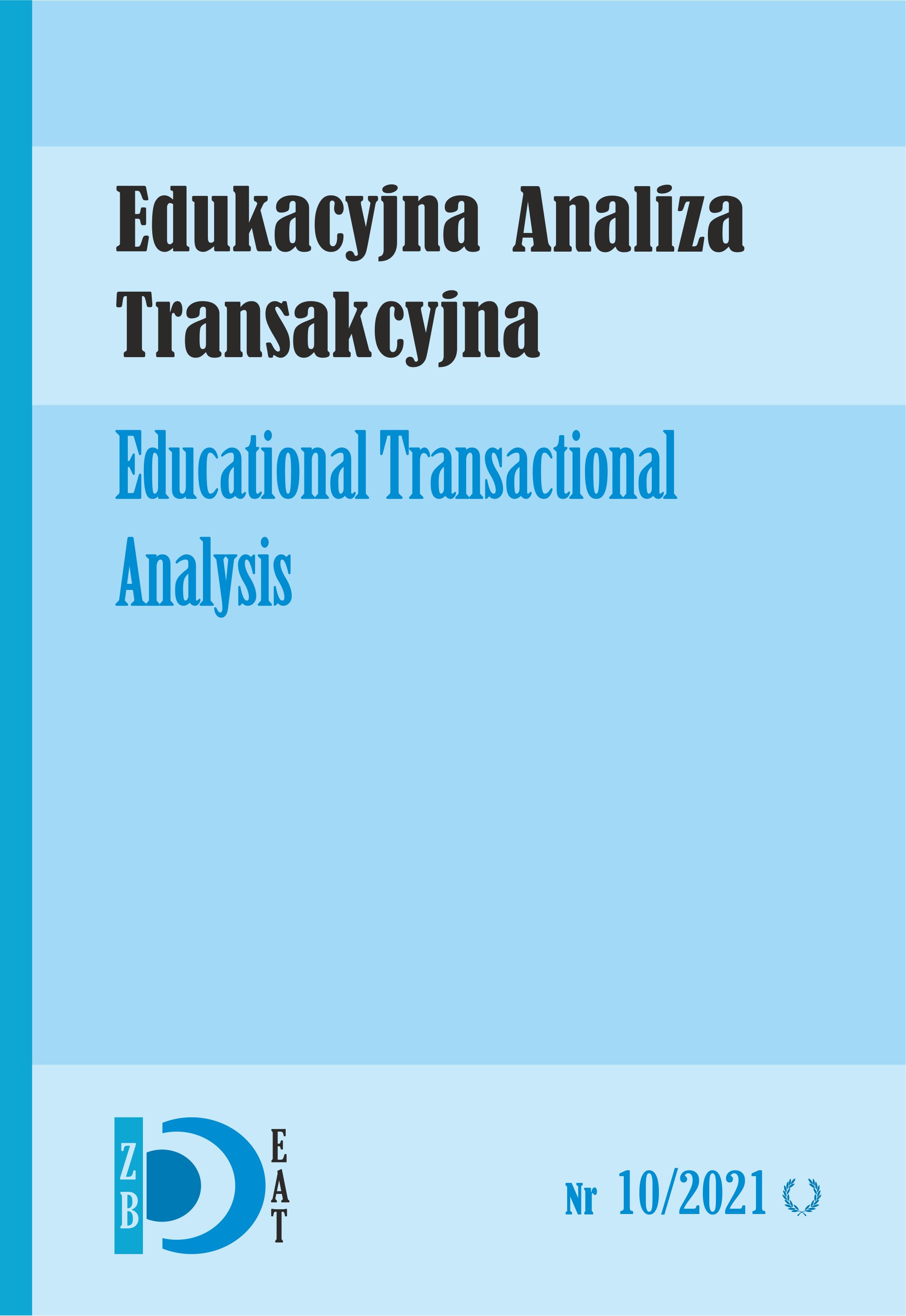Dydaktyczny wymiar badań elektroencefalograficznych w ujęciu edukacyjnej analizy transakcyjnej.
- Autor
-
-
Tomasz Prauzner
Uniwersytet Humanistyczno-Przyrodniczy im. Jana Długosza w Częstochowie -
Kacper Prauzner
Uniwersytet Mecyczny w Warszawie
-
- Słowa kluczowe:
- edukacja, dydaktyka, konstruktywizm, badania elektroencefalograficzne, EAT
- Abstrakt
-
W artykule przedstawiono wybrane wyniki badań autorskich, jakie prowadzone są w Laboratorium Badań Eksperymentalnych Biofeedback Uniwersytetu Humanistyczno-Przyrodniczego im. Jana Długosza w Częstochowie dotyczące aktywności dydaktycznej studentów w kształceniu technicznym. Przedstawione wyniki badań są częściową odpowiedzią na stawiane pytania w teorii edukacji technologii informacyjnej. Realizacja kształcenia online w dobie pandemii COVID-19 z wykorzystaniem deterministycznych symulacji komputerowych jest propozycją rozpoczęcia dyskusji dotyczącej znaczenia nowoczesnych technik przekazu informacji, jako kluczowego elementu komunikacji na drodze uczeń-nauczyciel.
- Pobrania
-
Statystyki pobrań niedostępne.
- Biogram autora
- Bibliografia
-
Addis, D. R., Barense, M., & Duarte, A. (2015). The Wiley Handbook on the Cognitive Neuroscience of Memory.
Bowers, J. S. (2016). The practical and principled problems with educational neuroscience. Psychological Review, 123(5), p.600–612.
Chojak M., (2019). Neuropedagogika, neuroedukacja i neurodydaktyka. Fakty i mity, Wyd. Difin.
Crawford, F. (2012). Uczestnictwo w transformacji systemu edukacji. W: Jakość edukacji. Różnorodne perspektywy, G. Mazurkiewicz (red.), Kraków: Wydawnictwo UJ.
Dryden G. Vos J., (2003). Rewolucja w uczeniu, Wydawnictwo Zysk i S-ka, Poznań.
Łęski, Z. (2017). Nowe media w społeczeństwie informacyjnym z perspektywy analizy transakcyjnej. Praca czy współpraca?, Edukacyjna Analiza Transakcyjna, 6.
Mietzel G., (2003). Wprowadzenie do psychologii, GWP, Gdańsk.
Osiński, Z., (2010). Metody, formy i programy kształcenia. W poszukiwaniu efektywnych metod kształcenia uniwersyteckiego, E-mentor, nr 2 (34).
Pankowska, D. (2012). Analiza transakcyjna w edukacji czy edukacyjna analiza transakcyjna? – próba porządkowania znaczeń. Edukacyjna Analiza Transakcyjna, 1.
Pawłowski, K., (2004). Społeczeństwo wiedzy – szansa dla Polski, Wydawnictwo Znak, Kraków.
Prauzner, T. (2013). Information Technology in Contemporary Education – Individuals’ Researche. American Journal of Educational Research, 2013, Vol. 1, No. 10, p.430-435.
Prauzner, T. (2015). Analysis of the results of the pedagogical research and EEG in the aspect of effective modern teaching aids in the technical education. Society. Integration. Education, Proceedings of the International Scientific Conference. Volume IV, May 22th-23th 2015, Rēzekne: Rēzeknes Augstskola, Latvia, p.480-489.
Prauzner, T. (2017). The effectiveness of school education - featured implications considerations. Society. Integration. Education, Proceedings of the International Scientific Conference. Volume III, May 26th-27th 2017, Rēzekne: Rēzeknes Augstskola, Latvia, p.558-564.
Prauzner, T. (2018). Cognitive mechanisms in the didactics of technical vocational subjects in the light of research on bioelectrical brain activity. Society. Integration. Education Proceedings of the International Scientific Conference. Volume I, May 25th-26th, Rēzekne: Rēzeknes Augstskola, Latvia, p.454-463.
Prauzner, T., (2020). Innovativeness of didactic practice in the field of current pedagogical knowledge, Society. Integration. Education., Proceedings of the International Scientific Conference., Volume II, May 22th -23th, Rēzekne: Rēzeknes Augstskola, Latvia, p.247-255.
Prauzner, T., Prauzner M., Prauzner K., Ptak P. (2019). Cognitive activity in the respect of qeeg research - presentation of laboratory tests. Society. Integration. Education., Proceedings of the International Scientific Conference., Volume V, May 24th-25th, Rēzekne: Rēzeknes Augstskola, Latvia, p.469-478.
Prauzner, T., Prauzner, K., Ptak, P., Noga, H., Migo, P., Depešová, J., (2020). Wpływ warunków otoczenia na dokładność badań elektroencefalograficznych QEEG (The influence of environmental conditions on the accuracy of QEEG electroencephalography). Przegląd Elektrotechniczny, R. 96 NR 4/2020, p.86-89.
Prauzner, T., Prauzner, M., Prauzner, K. (2019). Aktywność pracy mózgu w procesie dydaktycznym w ujęciu badań elektroencefalograficznych, Kwartalnik Naukowy, Edukacja – Technika – Informatyka, p.321-317.
Sikorski W., (red.), (2015). Neuroedukacja, Jak wykorzystać potencjał mózgu w procesie uczenia się, Wyd. Dobra Literatura, Słupsk.
Thompson, M., T. L. (2012). Neurofeedback, wprowadzenie do podstawowych koncepcji psychofizjologii stosowanej (The Neurofeedback Book. An Introduction to Basic Concepts in Applied Psychophysiology). Wrocław: Biomed Neurotechnologie Sp. z o.o. Sp. k.
Wietrzykowski, W. (2010). Biologiczna Sieć Pakietowa. Pobrane z: http://net3plus.awardspace.com (4.03.2018).
Zarzecki, L., (2008). Wybrane problemy dydaktyki ogólnej, Wydawnictwo Kolegium Karkonoskie w Jeleniej Górze, Jelenia Góra.
- Pobrania
- Opublikowane
- 30.12.2021 — zaktualizowane 30.12.2021
- Wersje
-
- 30.12.2021 - (2)
- 30.12.2021 - (1)
- Numer
- Nr 10 (2021)
- Dział
- Analiza transakcyjna w edukacji
- Licencja
-
Prawa autorskie (c) 2022 Tomasz Prauzner, Kacper Prauzner

Utwór dostępny jest na licencji Creative Commons Uznanie autorstwa 4.0 Międzynarodowe.
OŚWIADCZENIE AUTORA:
Mam świadomość, że czasopismo jest wydawane na licencji Creative Commons - Uznanie autorstwa (https://creativecommons.org/licenses/by/4.0/legalcode).
Przesyłając artykuł wyrażam zgodę na jego udostępnienie na tej licencji
Jak cytować
Podobne artykuły
- Krystyna Moczia, Marta Niemiec, Sam na sam pandemią. Utrzymanie status quo wśród podopiecznych MOPS prowadzących samodzielne gospodarstwo domowe , Edukacyjna Analiza Transakcyjna: Nr 11 (2022)
- Joanna Doroszuk, Between Parents and Teachers? – A Pilot Study on the Relationship between Parents of Children with Disabilities and Teachers , Edukacyjna Analiza Transakcyjna: Nr 13 (2024)
- Beata Gumienny, Psychiatrization as a mechanism for handicapping students with intellectual disability. Psychiatrisation in education , Edukacyjna Analiza Transakcyjna: Nr 13 (2024)
- Wioletta Dziarnowska, Meandry akademickiego mistrzostwa osobistego i myślenia systemowego w refleksji pracowników uniwersytetu związanych z dydaktyką , Edukacyjna Analiza Transakcyjna: Nr 14 (2025)
- Jacek Szedel, Bożena Wieczorek, Estymacja stanów ego: perspektywa uczenia maszynowego , Edukacyjna Analiza Transakcyjna: Nr 12 (2023)
- Karol Motyl, Pracuj albo graj! Pokój nauczycielski w świetle teorii analizy transakcyjnej , Edukacyjna Analiza Transakcyjna: Nr 14 (2025)
- Zbigniew Chodkowski, Poczucie skuteczności w opinii badanych studentów rzeszowskich uczelni , Edukacyjna Analiza Transakcyjna: Nr 11 (2022)
- Tomasz Prauzner, Kacper Prauzner, Zastosowanie założeń edukacyjnej analizy transakcyjnej w konstruktywistycznej teorii uczenia się. , Edukacyjna Analiza Transakcyjna: Nr 9 (2020)
- Justyna Józefowicz, Skuteczna szkoła w kryzysie COVID-19 , Edukacyjna Analiza Transakcyjna: Nr 10 (2021)
- Natalia Pendziałek, Doświadczenie groomingu w perspektywie „cyfrowych tubylców” , Edukacyjna Analiza Transakcyjna: Nr 12 (2023)
Możesz również Rozpocznij zaawansowane wyszukiwanie podobieństw dla tego artykułu.
Inne teksty tego samego autora
- Tomasz Prauzner, Kacper Prauzner, Zastosowanie założeń edukacyjnej analizy transakcyjnej w konstruktywistycznej teorii uczenia się. , Edukacyjna Analiza Transakcyjna: Nr 9 (2020)


